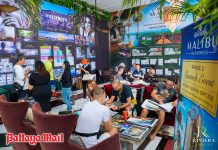Malaysia’s leading publicly listed property developer S P Setia Berhad is expanding its business to Indonesia with high expectations that Southeast Asia’s largest economy will provide big opportunities for high-end structures.
Setia, Malaysia’s biggest developer, marked its entry into the Indonesian market by officially launching its representative office in Jakarta earlier this year. The representative office was actually established in August 2011.
“We see great promise and potential in Indonesia and would like to get to know the country and its people better by having a representative office in the capital. As we seek to learn from you and understand your country better, we also hope that our presence will help you to get to know us more,” Setia president and chief executive officer Liew Kee Sin said.
The Jakarta office is the company’s fifth overseas destination after Vietnam, Singapore, Australia and China. Setia, whose market capitalisation reaches 7.7 billion ringgit (US$2.5 billion), is planning to establish a representative office in London soon.
Liew said that the representative office was not intended to be his company’s sales agent in the country.
“We are not allowed to sell in Indonesia. The office task is principally to show our projects in Malaysia, Singapore, Vietnam and Australia. In the long term, we want to explore the opportunity of investment,” Liew said.
Liew said that although Setia’s focus was on township development, the company was open to any possibilities of property development, including residential, office buildings and shopping centers.
Liew also said that his company was open to possible joint ventures with Indonesian companies.
“A joint venture can be established either in Indonesia or in Malaysia. However, there has been no assessment with Indonesian companies yet,” Liew said, declining to reveal how much his company had positioned itself for future investment.
Setia project director Richard Ong Kek Seng said that the company needed up to three years of study before finally starting a project.
“We need to understand the market first,” he said, admitting that cooperation with domestic companies would make the process quicker.
Apart from displaying its properties and window-shopping in investment, the company is expecting that the representative office helps it to source directly for Indonesian arts and crafts, building materials and furniture to be incorporated into its projects.
Liew pointed out that Setia had previously reproduced Indonesian architecture into the company’s signature projects.
“Duta Nusantara (a low rise development project started in 2006) in Kuala Lumpur was inspired by Indonesian architecture and the serene lifestyle offered by the many world-class resorts of Bali,” Liew said.
Rusmin Lawin, the secretary-general of the International Real Estate Federation (FIABCI) regional secretariat for Asia Pacific, said that there were no worries over Setia’s entry into the country competitive property market.
“As long as the market is growing and there remains huge backlogs, it’s okay,” Ruswin said, citing that Singaporean property developer Keppel Land had entered the country prior to Setia.




